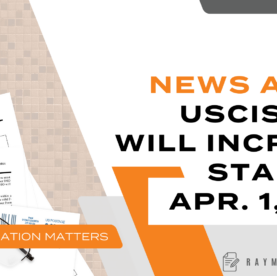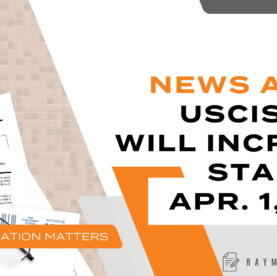Norris McLaughlin Immigration Chair Ray Lahoud Visits China

As part of Norris McLaughlin’s commitment to its global immigration practice, I was recently honored to travel to the People’s Republic of China for several days to conduct immigration seminars throughout Shanghai, meet with leaders in China’s manufacturing industry, and discuss tariffs and its impact on immigration with economic development and Chinese export officials, business leaders, and global investors. My intentions when embarking on this trip were to explore (in the little time I had) the Chinese economy and its reliance on United States exports, as well as the Chinese people’s willingness to invest in and immigrate to the United States.
I must say, I was quite impressed. I must say that the Chinese infrastructure–roads, highways, train systems–were the most developed that I have ever seen in all my travels. I know this may shock some readers; but, yes, it’s true. Chinese towns of all sizes and all across the country are connected by high-speed trains and bullet rails for quick travel from the farthest rural areas to downtown Shanghai. Highways have 7, 8, and even 9 separate layers stacked on top of each other with each layer 5 lanes in width. I must admit, however, that while the infrastructure is magnificent, the intercity congestion remains–trips across Shanghai often take hours.
My first days in Shanghai were spent visiting the first ever Chinese International Import Expo at the National Exhibition and Convention Center in Shanghai. Over 2800 companies from 130 countries and regions converged on Shanghai for the 5-day expo to meet with hundreds of thousands of buyers from across the globe. The expo was sponsored by the People’s Republic of China, with the World Trade Organization, the United Nations Conference on Trade and Development, and the United Nations Industrial Development Organization as the leading partners.
Following meetings and conferences throughout Shanghai with business leaders, members of the United States Commercial Service for the Department of Commerce, and members of the United States Department of State Oversees Diplomatic Security Counsel, I traveled by train nearly 6 hours north to the city of Wenling in the Taizhou Region of China’s Zhejiang Province. Wenling is a coastal town with nearly 1.4 million residents. The infrastructure, like that in Shanghai, is impressive. The traffic is equally congested, too.
Wenling is an industrial city – full of industrial parks and large distribution facilities within minutes of China’s greatest ports that give access to the global market. Wenling is where so many of the products we see in the United States originate ranging from clothing, tools, automobile parts, kitchen stoves, and couches to massive industrial machinery, forks, knives, and straws.
When in Wenling, I was guided by two of the region’s leading business leaders and manufacturing innovators–Mr. Xinfu Hu and Ms. Guilan Jiang. Mr. Hu is the Chief Executive Officer of Fuling Global Inc; Ms. Jiang is the global Chairwoman. The two founded the company in 2000 as a small manufacturer of basic household items and baskets. Fast-forward to present, and Fuling is the global leader in plastic cutlery, paper straw, and plastic straw manufacturing and distribution. In 2015, Fuling went public on the Nasdaq, trading as FORK. To meet the growing demand in the United States, Fuling expanded its manufacturing operations in June of 2016, opening an 88,000-square-foot manufacturing facility–its North American hub–in Allentown, Pennsylvania.

Following hours of touring Fuling’s manufacturing facilities, which sprawl over hundreds of acres and dozens of buildings, I held several collaboration sessions with local manufacturing leaders to discuss their concerns related to the current tariff situation between the United States and China, its impact on Chinese investment in and immigration to the United States, and ways to mitigate, rather than completely withdraw from the global marketplace. Many were concerned about what would come next, but shockingly, most were willing to work through the higher tariffs for the time being, with the hope of the two countries reaching a compromise.



These same concerns were echoed in a seminar sponsored by Fuling Global, Inc. and the China Taizhou Plastics Industry Association: “Immigration and Investment in the United States: The US Really Is Open to China.” With over a hundred in attendance, the seminar focused on the American consumer market, the impact of the increased tariffs on that market, foreign direct investment, non-immigrant and immigrant visas, and the EB-5 investor visa program. Listeners were keen on learning how to expand their businesses into the United States – how to import into America – how to open their own American facility. Many wanted to invest in the United States. Some sought to immigrate. One person was concerned about whether America’s infrastructure was capable of increased economic development–a valid issue. In the room, however, was an apparent lack of knowledge about the politics–about the current U.S. administration and what it will next do. Will President Trump keep the promise to further increase tariffs? What impact will that have? How long will it last? No one feared making the investment in the United States, continuing to export their products, or immigrating to the United States.
Rather, those in the room were still willing to put the politics aside, hoping that the tariff, intellectual property, and growing immigration barriers between the two counties are just that–temporary political disputes. The Chinese business leader, investor, manufacturer, and consumer all see eye-to-eye with their American counterparts: that globalization is alive and well, and crucial to it is the ease in the global migration, or immigration, of the world’s people.
If you have any questions about this post or any other immigration matter, feel free to contact me at rglahoud@norris-law.com.





